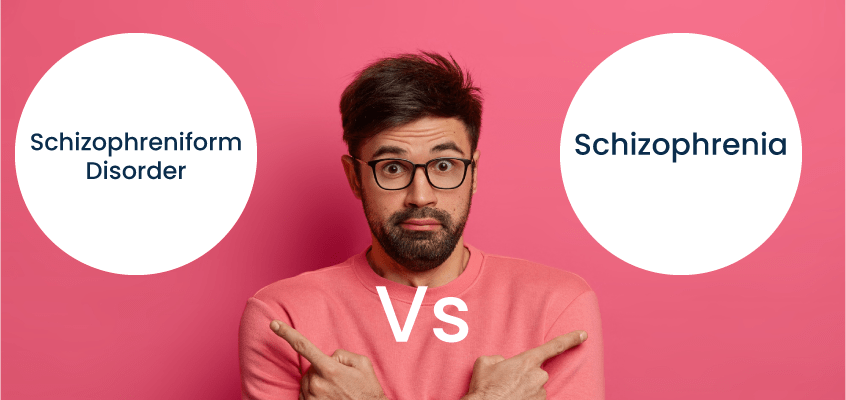Introduction
Schizophrenia is a mental disorder that affects a person’s ability to think, feel, and behave clearly; it can be debilitating and require lifelong treatment. In contrast, while Schizophreniform Disorder is a psychotic condition that causes symptoms similar to that displayed in Schizophrenia, the illness lasts between one and six months instead of lifelong like Schizophrenia. Read on better to understand the differences between Schizophreniform Disorder and Schizophrenia.
What is Schizophrenia?
Schizophrenia is one of the most well-known mental disorders, but there is often confusion about what it is. Schizophrenia is a severe mental disorder affecting a person’s thoughts, emotions, and behaviours. People with Schizophrenia may seem like they have lost touch with reality. Classic symptoms include hallucinations, delusions, disorganized thought and speech patterns, and irregular motor functions.
While Schizophrenia can be debilitating, it is essential to remember that people with Schizophrenia are not generally violent and pose little danger to others. With proper treatment, many people with Schizophrenia can lead productive and fulfilling lives.
What is Schizophreniform Disorder?
Hey, the writer has made the said changes. Schizophreniform Disorder is a mental illness characterized by symptoms similar to Schizophrenia but typically lasts for a shorter period. People with Schizophreniform Disorder may also experience symptoms such as delusions, hallucinations, disorganized speech and thought catatonic behaviour, and diminished emotional expression. If the above symptoms are predominant for at least a month but less than six months, it may be a Schizophreniform Disorder. While the exact causes of this condition are unknown, its onset may occur as a combination of genetic and environmental factors.
Differences Between Schizophrenia and Schizophreniform Disorder
Both Schizophreniform Disorder and Schizophrenia are mental disorders that share many symptoms, but there are some key distinctions.
Schizophrenia
Schizophrenia is a chronic, severe, and disabling mental Disorder. People with Schizophrenia may hear voices that no one else can listen to or see things that no one else can see. They may believe that others are trying to harm them or that they are being watched or followed. It can lead to paranoia and social withdrawal. Schizophrenia usually begins in early adulthood, and the symptoms can be debilitating. If someone in your family is showing signs of Schizophrenia, it is imperative to help them get the medical help they need as soon as possible.
Schizophreniform Disorder
Schizophreniform Disorder is a less severe form of mental illness than Schizophrenia, and most people who have it will eventually recover. The symptoms are similar to those displayed in Schizophrenia, but they tend to be less intense and last for a shorter period. Schizophreniform Disorders usually start to develop in late adolescence or early adulthood.
Causes of Differences Between Schizophrenia and Schizophreniform Disorder
Hey, the writer has made the said changes. While the exact causes of Schizophrenia and Schizophreniform Disorder are unknown, research suggests that both conditions result from a combination of genetic and environmental factors.
Here are 3 prominent causes of these disorders:
Biological factors
Some people may have a tendency to develop either condition due to their genes. However, the biological predisposition only increases the risk factor but does not directly contribute to developing the condition.
Environmental factors
Environmental factors can also trigger the onset of symptoms. A combination of stressful life events and exposure to viruses or other toxins may also provoke both disorders.
Psychological factors
A major traumatic life event such as physical, emotional, or sexual abuse, the loss of a loved one, and similar hardships can also contribute to these conditions.
Treatment for Schizophrenia and Schizophreniform Disorder
There is no one-size-fits-all answer regarding treatment for Schizophrenia and Schizophreniform Disorder. The most important goal is to work with a mental health professional who can tailor a treatment plan to your individual needs. That said, some general principles apply to both disorders.
Medication
Both Schizophrenia and Schizophreniform Disorder typically require long-term treatment. Anti-psychotic medications are the cornerstone of this treatment, and they can effectively reduce symptoms. However, these medications don’t work for everyone and can have unpleasant side effects.
Therapy
Psychotherapy can be helpful, especially sessions that focus on helping people manage their symptoms and cope with the challenges of mental illness. Family therapy can also be beneficial, as it can help educate loved ones about the disease so they can provide increased support for the patient.
Self-Care
Lastly, following the basics such as getting enough sleep, eating a healthy diet, and exercising can help reduce symptoms of Schizophrenia and Schizophreniform Disorder and improve overall well-being. Avoiding drugs and alcohol is also an essential form of self-care, as substance abuse can worsen symptoms and make it more challenging to stick to treatment.
The prognosis for Schizophrenia and Schizophreniform Disorder
It is difficult to predict the long-term outcome for people with Schizophrenia and Schizophreniform Disorder. In general, people with Schizophrenia have a less favourable outlook than those with Schizophreniform Disorder.
However, both disorders can lead to significant social and occupational functioning impairment. Once diagnosed with either of the conditions, it is imperative to seek medical help, as any delay can cause the condition to worsen.
Family members often have the responsibility to support someone going through such mental health issues. They should do their best to ensure that the affected person gets the medical help they require.
Conclusion
Schizophreniform Disorder and Schizophrenia share many similarities but also crucial differences. Schizophrenia is a severe mental illness that affects a person’s thoughts, emotions, and behavior. Schizophreniform Disorder has many of the same symptoms as Schizophrenia but is a shorter-term mental illness. Although both conditions can be disabling, people with Schizophreniform Disorder have a better prognosis than those with Schizophrenia. With early diagnosis and treatment, most people with Schizophreniform Disorder can live productive lives.
If you’re looking for help with a mental issue or you know someone who is struggling, visit the United We Care website today! Our team of expert counselors and mental health professionals can address all your mental health issues and guide you through your journey to recovery.
References:
https://my.clevelandclinic.org/health/diseases/4568-Schizophrenia
https://www.rosehillcenter.org/mental-health-blog/schizoaffective-disorder-vs-Schizophrenia/
https://www.verywellmind.com/schizophreniform-vs-Schizophrenia-whats-the-difference-5218312
https://www.webmd.com/Schizophrenia/Schizophrenia-schizoaffective-disorder










